#john ciardi
Note
hello! for some reason, the thought of asking about web weaving prompts completely escaped me until now. you're the first I am asking! hello!!!
I don't see this sort of web weaving subject around, so is it possible to make one about an abandoned AI? (the fictional, sapient kind, not the ones irl lol)
like an AI, with a sapient mind, just..... alone. lost between the lines of code in cyberspace, wishing for someone like them to destroy their isolation




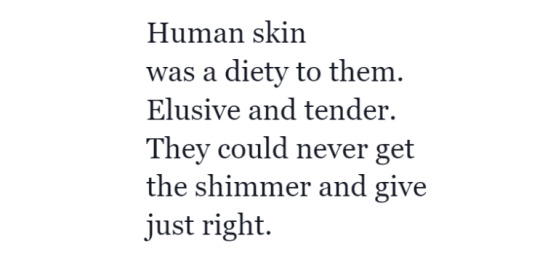
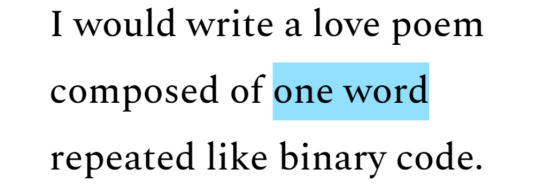

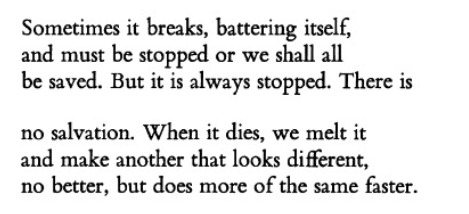
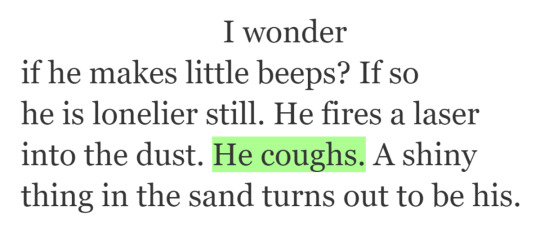






How can you mourn for something not living?
I hope this fills the prompt well! It was very interesting to do. I'm sorry it took so long! ;^^
Subtitle, Weldon Kees | Can't Help Myself, Oliver Rain | Ancient Dreams in a Modern Land, MARINA | If I Were Paul, Mark Jarman | Robot Apocalypses, Beatrice Bywater | One More Love Poem, Dunya Mikhail | Just Take My Wallet, Jack Stauber | Machine, John Ciardi | There Is Absolutely Nothing Lonelier, Matthew Rohrer | Conjure, Rachel Blau DuPlessis | More than whispers, less than rumors, Bob Hicok | The Day the Saucers Came, Neil Gaiman | The Birds Outside My Window Sing During a Pandemic, Lee Herrick | End Poem, Julian Gough | 2001: A Space Odyssey, Arthur C. Clarke & Stanley Kubrick
[text transcription and image ID in alt text]
#requests#webweaving#compilation#web weave#web weaving poetry#parallels#prose#literature#༺✿ web weaves by basil ✿༻#weldon kees#oliver rain#mark jarman#beatrice bywater#dunya mikhail#john ciardi#matthew rohrer#rachel blau duplessis#bob hicok#niel gaiman#lee herrick#mmm i just couldnt resist including some of my favorite 'machine tragedies' in here#like oppy and cant help myself. and the ibm 7094 if you count the space odyssey quote.
54 notes
·
View notes
Text
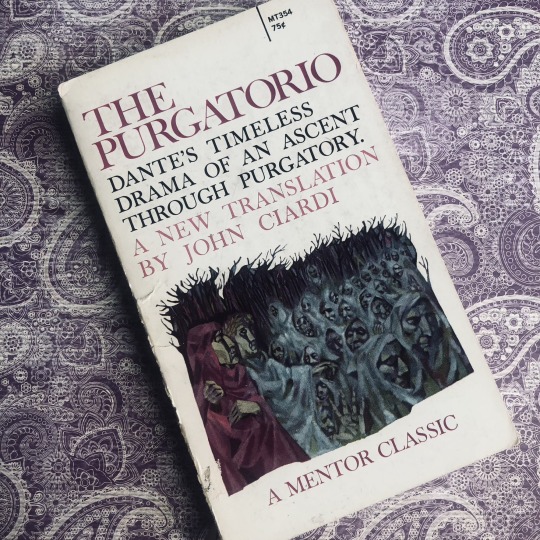
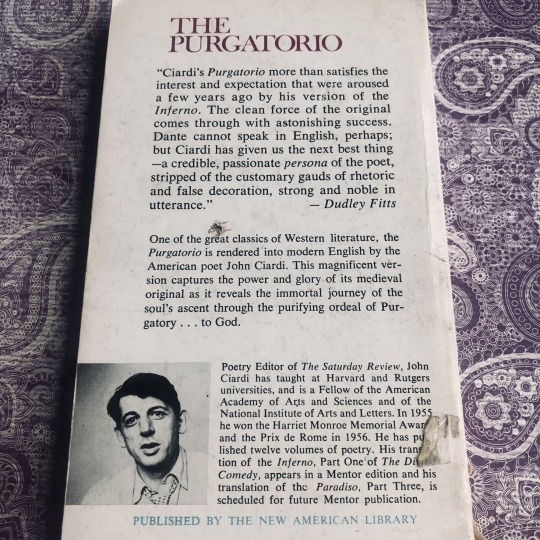
The Purgatorio
Dante (trns. John Ciardi)
This is 1 of 12 vintage paperback classics that comprise our current giveaw@y.
40 notes
·
View notes
Text
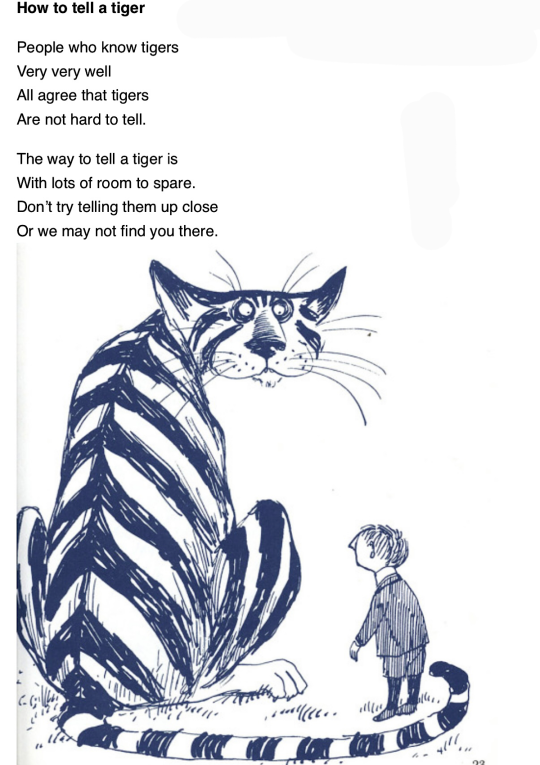
~~John Ciardi, artist Edward Gorey
17 notes
·
View notes
Note
Random question:
I noticed you mentioned reading the Divine Comedy on a a previous post, and wondered what translation you owned? I’ve only started to read Henry W. Longfellow’s translation.
John Ciardi's translation! I didn't know much about the different translations, so I ended up picking his because it came with all 3 canticles. His comes with a lot of notes that help contextualize certain references to events of the time, and explanations of old sayings or concepts.
...I actually still need to finish Paradiso. I... think I left off on Jupiter...?
Paradiso is good but I got really invested in Virgil (for... obvious reasons)... I really thought Dante's love of Virgil was interesting considering that he's an "honorable pagan", as well as how deep their relationship ends up being. Plus Inferno and Purgatorio had a lot of dramatic depictions of sinners and sins.
Beatrice is also interesting, but Beatrice feels less like the woman he crushed on/was inspired by and more like that woman used as the vessel for endless praises and love of god. Paradiso in general feels a lot flatter and more hollow for me, perhaps because I'm not that interested in the wonders of approaching the divine and holy love of the Christian god?
2 notes
·
View notes
Note
The scottish musician and writer Momus said in 1991 that in the future "everyone will be famous for 15 people". Do you see literary fiction going in that kind of direction? What could be the motivation behind the mentally demanding task of writing? especially if one is resigned to a ultra niche audience? (aside from vagaries like "self-expression or catharsis"
Funny, I was just thinking about Momus the other day—about how much he'd hate the sight of Lost in Translation on my movie list! His online essays from the early 2000s were superb, models of the blog form, a definite influence on my online writing. And I like that quote too; I hadn't remembered it was his. Related to your question, I'm glad to see all his writing is still up and hasn't vanished into the ether.
To answer your question circuitously, I will return to another early influence of mine: a crumbling college anthology—Literature, second edition, ed. Hans P. Guth (1968)—I bought for a dollar at a library book sale when I was in middle school. (I wrote a little about it here and here.) In this book I had my first encounters with Keats, Blake, Eliot, Yeats, Kafka, Joyce, Hemingway, Faulkner, and more.
It also contains an essay from 1958 called "Dialogue with the Audience" by the poet John Ciardi, who's still remembered, I think, for his Dante translation if not for his own work. The essay is structured as a Platonic dialogue between Ciardi, the expert poet-critic, and the Citizen, a common reader who was inspired to buy a volume of Wallace Stevens by one of Ciardi's reviews and challenges Ciardi because he didn't understand its difficult modernism.
After explaining modern poetry's refusal of utilitarian sense-making to the stolid Citizen—
"Well, what do you mean by sense? Stevens does not write for factual-information sense. Why should he? He picks up a theme and orchestrates it. His 'sense' is a structure. The reader must keep the total structure in mind in order to grasp Stevens's kind of sense. He does not, moreover, 'mean' any one thing, but rather all the possibilities of all the relationships he is orchestrating."
—Ciardi further claims that a literary work has two audiences: the horizontal audience of its contemporaries and the vertical audience of those who come later. Some poets, he continues, have a massive horizontal audience but are not guaranteed a vertical audience, presumably because they are not open to overinterpretation, because they mean too little ("any one thing").
On the other hand, other poets have a very limited horizontal audience but a long and very substantial vertical one.
"All good poets write for the vertical audience. The vertical audience for Dante, for example, is now six centuries old. And it is growing. If the human race has any luck at all, part of Dante's audience is still thousands of years short of being born."
You earn your vertical audience by not being too transparent, not being too conventional, not being too didactic: "all good poets are difficult when their work is new," Ciardi says, echoing T. S. Eliot.
His example of the popular poet, the poet much more well-known and celebrated in the mid-20th-century than the recondite Wallace Stevens, is Edgar Guest. It's a perfectly chosen illustration of the point: while Ciardi couldn't have known this for certain in his own time, the once-inescapable Guest, with his radio and television shows, has been completely forgotten in our time, while Stevens remains in every anthology.
From this I concluded as a very young budding writer that you didn't need a lot of readers, you just needed the right readers (fit audience though few, as Milton said), and that the best readers of all might be those not yet born.
As for literary fiction in particular: I think it's been going that way for a long time. The proliferation of small presses and self-publishing, along with the waning charisma of mainstream publishers, just hastens the process. I also think, however, that this was the historical norm for serious literature—see the complaints of Hawthorne, Melville, and James in the 19th century; consider that Woolf, Joyce, and Eliot were for all intents and purposes self-publishing—and that the post-World-War-II period was an extraordinary historical exception, one made possible by broadcast media and a consequently greater degree of cultural centralization than we would (for better and for worse) now find tolerable.
While it's hard not to mourn the death of mass literacy, especially considering Ciardi's era of popular modernism when Eliot filled Williams Arena up the street from where I now type, I still prefer to emphasize the opportunities the present affords. For example, the fact that you and I are able to have this exchange, that the ability to get the word out is more widespread now than it's ever been, that there are podcasts, YouTube channels, Subtacks, etc. devoted to serious literature and criticism.
And even the contemporary ultra-niche audience is probably larger now than it ever was. Ciardi mentions that even Keats was thought too difficult or strange or pretentious by his contemporaries. To use an example I've used before, I've also read that Keats sold 200 books in his lifetime. Meanwhile, between Tumblr, Goodreads, Wordpress, Substack, and YouTube, I have over 1000 readers or listeners a day. I fill my stadium every week or two. Seen in that light, the present is really not so bad, nor the past so great.
And finally, forget self-expression and catharsis—I do it because it's fun to do!
3 notes
·
View notes
Note
Which translation of Dante are you reading? I've been wanting to pick it up
thank you for giving me something fun to think about that isn't "my sims game is imploding" or "I got four hours of sleep and I'm crabby"
okay SO
I'm reading John Ciardi's translation of the Divine Comedy right now. A lot of people recommend it as one of the best renderings of the Comedy; the internet also seems to like Pinsky, Hollander, Sinclair, Sisson, and (if you want a slangier, more modern translation) Sanders/Birk.
What you really need in a translation of Dante, more than anything, is good goddamn footnotes. I'd avoid the Project Gutenberg translations like the plague- not because they're necessarily unfaithful, but because unless you are already an expert on medieval Italy you are going to be lost as all hell (pun unintended) without an explanation of what's going on.
Dante's doing a lot of stuff with structure, form, and reference that it's possible to completely miss out on if you aren't coming from that context. Ciardi calls his worlds "architectonic"- they're huge works of architecture with a lot of parts that move, slow and majestic, like tectonic plates. If you don't have the motion or the details of the architecture pointed out to you, you're gonna miss it.
#inferno#the divine comedy#dante alighieri#literature#classic literature#dante's inferno#john ciardi
24 notes
·
View notes
Text
Campus Creativity
Walking my old college campus in summer and in memory
It is summer and so most campuses are quiet. My favorite time on campus – whether it was at a college or secondary school and whether it was as a student or as a teacher – was always September and early fall. New people, new books, new courses. It seemed hopeful and full of possibilities. But summer on campus also has its charm.
In summer, there is quiet and a kind of calmness that seems to come…

View On WordPress
2 notes
·
View notes
Text
‘Dante and Virgil Penetrating the Forest‘, William Blake, 1824–7 | Tate
https://www.tate.org.uk/art/artworks/blake-dante-and-virgil-penetrating-the-forest-n03351
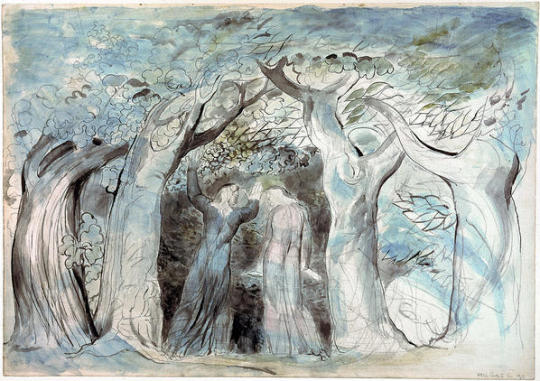
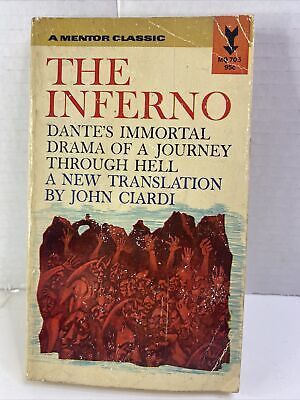
The Inferno (The Divine Comedy) translated by John Ciardi (1954).
#Dante#lectura dantis#writing#art#books and art#margininversi#media#arte#museum#Kunst#poetry#Claudia Ciardi#Virgilio#painting#Dante Alighieri#the divine comedy#poetry and art#books and libraries#John Ciardi
3 notes
·
View notes
Photo
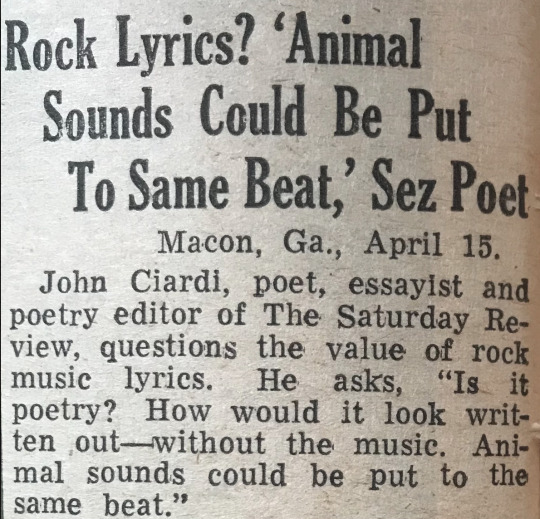
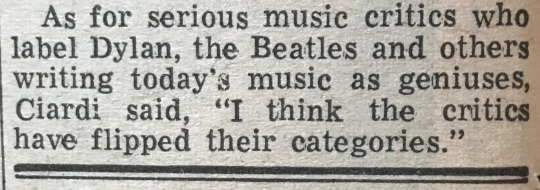
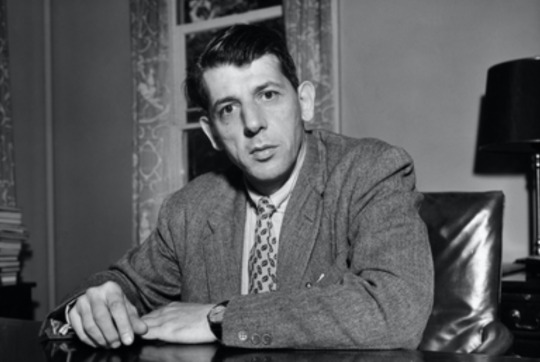
youtube
Music hater John Ciardi
8 notes
·
View notes
Text

The Dolls, John Ciardi
2 notes
·
View notes
Text
“Dante’s Tongue”
The poet John Ciardi described translating
Dante’s Inferno from Italian to English
as playing a tune meant for the piano
on a violin.
Understanding usually means sacrificing something.
Understand that HRT did nothing for my voice.
The chemicals that curved the basin of my body violin-deep
and cured the catgut ache in my stomach into strings
and a long silent song did nothing to un-piano the tune.
They did nothing to translate the Italian
and make me sound like a new tongue.
No matter how hard I pinch the stubborn reed of my throat.
No matter how many times I whisper, like a prayer, the exercises
Heat from fire. Fire from heat.
No matter how I Psycho and Hitchcock
and crash the strings,
I still sound like Norman.
I am still called “Sir” over the phone,
still stopped at the gates with my runaway tongue,
still all black and white stones down my throat.
The blooming cello of my hips does nothing
about the parade of hammers
that clang for the Fatherland.
I am still a Dante stuck out of Florence
like a living contrapasso
made to scream
for the sin of telling the truth with my skin,
for covering with soft hands
the braying alphabet of my birth.
I am trying to be music
to speak like a poem
with nothing lost in translation.
But I know what I sound like
playing piano with strings,
and it sounds like John Ciardi
sweating over the manuscript.
Like Dante second-hand.
I know what it sounds like.
It sounds like hell in a symphony hall,
like a mad poet
no one understands.
1 note
·
View note
Text
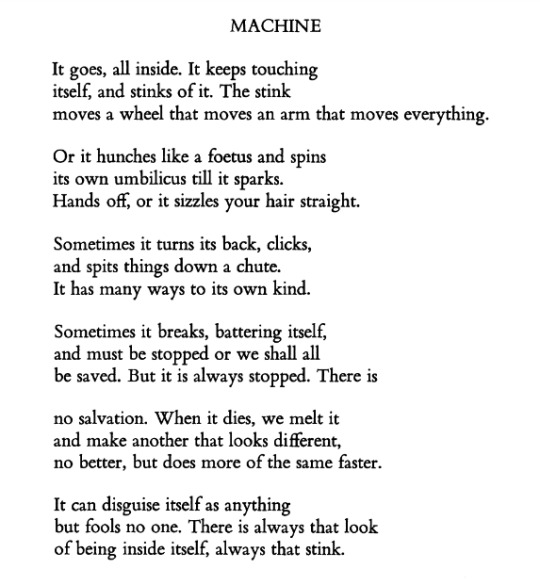
Machine, John Ciardi
#poetry#poem#literature#poemblr#poems and poetry#poem of the day#machine#john ciardi#I queue you would forget forget-me-nots
15 notes
·
View notes
Text

Photo credits: H. Armstrong Roberts
Why Nobody Pets the Lion at the Zoo
John Ciardi
The morning that the world began
The Lion growled a growl at Man.
And I suspect the Lion might
(If he'd been closer) have tried a bite.
I think that's as it ought to be
And not as it was taught to me.
I think the Lion has a right
To growl a growl and bite a bite.
And if the Lion bothered Adam,
He should have growled right back at 'im.
The way to treat a Lion right
Is growl for growl and bite for bite.
True, the Lion is better fit
For biting than for being bit.
But if you look him in the eye
You'll find the Lion's rather shy.
He really wants someone to pet him.
The trouble is: his teeth won't let him.
He has a heart of gold beneath
But the Lion just can't trust his teeth.
"Reflections on a Gift of Watermelon Pickle... And Other Modern Verse" - compiled by Stephen Dunning, Edward Lueders, and Hugh Smith
#book quotes#poetry#reflections on a gift of watermelon pickle#stephen dunning#edward lueders#hugh smith#why nobody pets the lion at the zoo#john ciardi#lion#growling#growl#bite#biting#shy#tit for tat#teeth#heart of gold#h armstrong roberts
0 notes
Text
The trouble is: his teeth won't let him.
Why Nobody Pets the Lion at the Zoo, John Ciardi
From "Reflections on a Gift of Watermelon Pickle... And Other Modern Verse" - compiled by Stephen Dunning, Edward Lueders, and Hugh Smith
#book quote#poetry#reflections on a gift of watermelon pickle#stephen dunning#edward lueders#hugh smith#why nobody pets the lion at the zoo#john ciardi#lion#teeth
1 note
·
View note
Text
John Ciardi: Good question
“A good question is never answered. It is not a bolt to be tightened into place but a seed to be planted and to bear more seed toward the hope of greening the landscape of idea.”
—John Ciardi.
View On WordPress
0 notes
Note
hiii which tl of the inferno did u read
yo! i’ve read a few of em, ranging from robert & jean hollander + john ciardi + allen mandelbaum + carlyle-wicksteed. not thoroughly, of course. just thru certain parts that i either needed further clarification on or simply preferred the translation of.
#in one of my posts i used robert & jeans tl mainly because i liked how they interpreted canto v#but! from what i can gather most people prefer john ciardi’s tl since it’s more….. truthful to the original italian poetry i believe?#i could be terribly wrong tho lmao#anon#either way i hope this helped!
1 note
·
View note